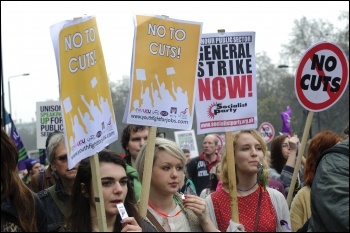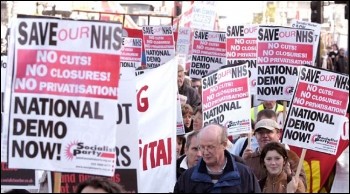Editorial of the Socialist
How can the Con-Dem coalition be most effectively punished?
In two weeks’ time voters will have their first opportunity to demonstrate their views on the Con-Dem government at the ballot box. After a year of economic stagnation, growing poverty, and vicious cuts; no one is in any doubt what the result will be.
Tory central office has been quoted as saying: “we expect to take a hammering” and has repeatedly emphasised that they expect Labour to gain over 1,000 seats.
However, it is the Liberal Democrats, widely seen as having broken key election pledges such as on university fees, who will take the worst beating. One ex-Lib Dem voter summed up the mood of millions when he said to the Financial Times: “I will never vote for them again, they lied and betrayed us.
I’m even voting against AV [the ‘alternative vote’ electoral reform] purely to spite the Lib Dems. I know it’s vindictive, malicious and childish. That’s the point.”
Far from being seen as ‘vindictive, malicious and childish’ punishing the Lib Dems will be the main motivation for many voters in the AV referendum. The latest opinion polls put the ‘no’ camp 16 points ahead, not because of enthusiasm for the existing voting system, but because AV is not an improvement.
The polls reflect a burning desire to make the Lib Dems pay for their crimes. The government is in a no-win situation.
If AV was to win a majority it would cause the Tories real problems, widening the split with the extreme right in the party, who have threatened to attempt to stop AV becoming law.
However, for Liberal Democrats, electoral reform was the sugar designed to sweeten the bitter pill of joining the coalition. Losing the referendum, combined with disastrous losses in the May elections, could be the trigger that forces the Lib Dems out of the government.
The Lib Dems could also face a split, with some wanting to stick with the Tories in power and others fearing that maintaining the Coalition will spell the end for the Lib Dems as a party.
This government could become one of the shortest lived in Britain’s history. On the other hand, the ‘glue of power’ could hold the coalition together for now.
However, this will be in the teeth of enormous opposition from the population of Britain. AV is the issue around which the cracks in the coalition show most clearly, but the root cause is the growing movement against the cuts.
The effects of the gigantic trade union demonstration against the cuts on 26 March are continuing to be felt. The demonstration will be followed by coordinated strike action on 30 June by some public sector unions, including PCS, NUT and UCU.
Pressure is growing on the leaders of other trade unions to take part in a 24-hour public sector general strike. When the Royal College of Nursing, which had a ‘no strike clause’ until 2008, threatens strike action it is a clear indication of widespread support for strike action against cuts.
The government’s macho posturing, claiming that it has ‘no Plan B’, has been shattered by events. This year it has retreated on a number of issues – including privatisation of the forests and partially on EMA student payments.
However, it is over the NHS that it has shown the most weakness. The government’s plans are for the effective destruction of the NHS.
This was always going to provoke massive opposition.
Capitalist commentators in the Financial Times and the Economist have warned from the beginning that it may be “a step too far”. The government ploughed ahead regardless, only to show their weakness by calling “a pause” when Tory and Lib Dem backbenchers started to panic that attacks on the NHS might lose them their seats.
This does not mean that the attacks on the NHS have been stopped. Across the country major cuts are already taking place, leading to a dramatic increase in waiting times.
One survey of GPs reported that more than three-quarters (77%) said they were experiencing cuts in fertility services in their area, 40% were experiencing restrictions in ophthalmology eye health services.
Almost a third (30%) of GPs said there were restrictions on orthopaedic services. More than half (54%) said waiting times had gone up for musculoskeletal work and a third were experiencing delays in cardiology.
Profit vultures
Meanwhile the vultures in the private health companies are rubbing their hands in glee, expecting their business to boom as NHS services are cut back.
The government’s primary motivation to continue the assault on the NHS is the desire to create new profitable fields of investment for the capitalist class.
However, having hesitated, it will now be virtually impossible for them to fully implement their plans for the NHS and, if the anger against NHS cuts is organised and mobilised they can be forced to retreat completely.
A victory on the NHS will give enormous confidence to the movement against the cuts as a whole.
While the opposition to the government is growing exponentially, it is not reflected in parliament. Labour is ahead in the polls, and will undoubtedly take control of many local authorities on 5 May, but ‘ineffectual Ed’ is leading a virtually invisible opposition.
Whatever Ed Miliband’s failings as a leader, the main reason for Labour’s political weakness is their message, which can be summed up as ‘we’d cut too, but a bit slower’.
There is no fundamental difference between the politics of Labour and those of the government. The Con-Dems’ attacks on the NHS are built on the foundations of New Labour’s foundation hospitals.
New Labour abstained on the Welfare Reform Bill – which will drive millions of benefit claimants into unbearable poverty, but many of the cuts were mooted under Labour governments.
New Labour was not prepared to support the student movement, not surprising as it introduced fees in the first place. Miliband’s first speech as leader declared that New Labour would not support “a wave of irresponsible strikes” – a clear indication that it would not support strike action against cuts and Lord Hutton, the architect of the attack on pensions, was a New Labour minister, commissioned to attack pensions by the last government! At local level every single Labour council has voted through cuts.
Often these are just as large as those carried out by Liberal and Tory councils. For this reason on 5 May some workers, where they have the opportunity, will send a message against all cuts by voting for Trade Unionists and Socialists Against Cuts candidates.
The majority, however, will vote Labour, seeing it as the best means to punish the government and in the vain hope that Labour’s ‘slower cuts’ will be less painful.
More voters will then face axe-wielding Labour councils.
It is possible that Labour will also be in power nationally before the end of 2011. The leadership of New Labour would undoubtedly prefer the Con-Dem government to survive, so they can hide in the wings hoping to come back to power after ‘the worst is over’.
This, however, may not be an option if the government collapses in the face of mass opposition.
A Labour government would then be faced with coming to power against the background of an economic crisis and a mass movement against cuts. However, as Labour is tied to the interests of capitalism, that government would not break with the ‘market’ but would attempt to continue to implement the cuts, albeit perhaps at a slightly slower pace.
The working class in Britain is beginning to flex its muscles. The need for it to also have its own political voice is increasingly urgent.
We call on the trade union movement to stop funding New Labour and to start to build a mass working class party which offers a socialist alternative to the axe men and women from all three capitalist parties.
The Trade Unionist and Socialist Coalition – which is standing in over 180 seats on 5 May – is a step towards such a party.










